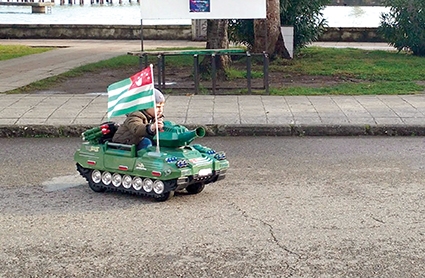Abkhazia, through the Eyes of a Tourist, Part 1
Op-Ed
Sandwiched between Russia and Georgia-proper, a small piece of land, roughly 200km in length, is claimed by three separate parties. The land is, officially, part of Georgia’s territory, and Official Tbilisi says that it is occupied illegally by Russia. Abkhazia is only recognized by 4 UN member states as an independent republic. Abkhazia is almost entirely dependent on Russia, and Russia believes (secretly) that it is part of their territory; it certainly felt that way.
The real lure for me was the way it is described by my country’s (UK) travel advisory service, the Foreign and Commonwealth Office. “[We] advise against all travel to the breakaway region of Abkhazia, and against all but essential travel to areas near the Administrative Boundary Lines with Abkhazia.” This level of warning is given to places such as Syria and parts of Afghanistan. So, with my only European friend in Georgia and his Lithuanian, Russian-speaking friend, we decided to make an adventure out of it.
The process of getting in to Abkhazia as a tourist is fairly straight-forward, albeit quite strange. It seemed to be, in my eyes, a bit pretentious. First of all, we had to send a request, no less than 5 days before proposed entry, to the Abkhaz Ministry of Foreign Affairs in Sokhumi (or ‘Sokhum’, as they call it there). Once the letter had been issued, we brought it, along with our passports, to the occupation line.
We were brought into a small interview room and asked a series of seemingly irrelevant questions; it was as if they were just doing it for show. We thought the same for the ‘bag search’ that happened afterwards, because all that we were asked to do was open our backpacks and show what was on the top. I felt like how I imagine my parents did when I was a child playing games in imaginary worlds. They used to go along with such fantasies to keep me happy, they were good like that. And we were doing very much the same today for the men in the Abkhaz military costumes, who were pretending that we were entering their "country."
Very few times in life do places turn out to be how you imagined, but the border crossing to war-ruined Abkhazia was an eerie exception. It was a truly depressing scene; the sodden sky was like a grey sponge looming over us with irregular light downpours. Before it could meet the horizon, it blended into a surrounding ring of heavy ominous clouds which snaked around the mountains, constricting the potential beauty of the landscape.
As we crossed the bridge from the Georgian checkpoint to the Abkhaz, a number of roadblocks had been placed to slow vehicles down, and behind them were road spikes ready to pull out at a moment's notice. The air felt heavy with the evident tension from the unsettled disagreement.
If you have ever owned an orchid flower then you will know how difficult it is to care for, and how, when not properly treated, it slowly recedes into itself, gradually dropping leaves and losing roots. Sokhumi (our first stop) was like the last sign of life from the orchid which is Abkhazia, and on the drive in we saw the result of mal-treatment. The 60-minute journey was even more depressing than the border crossing; littered with derelict concrete constructions, the consequence of an uncomfortably recent war; it was like being taken through the set of a post-apocalyptic film.
We spent the remaining few hours of the day wandering along the seafront and sampling the local food in an Abkhaz restaurant, which served Georgian food with absolutely no difference in presentation or recipe. They wouldn’t admit where it was from, though. Later, we bought some Churchkhela - the most Georgian food item around. For our amusement, and out of curiosity, we asked the woman behind the counter where it came from. “Turkey,” was the answer she gave.
The center Sokhumi was, and still is, a holiday destination for Russian tourists. It was comparable to other seaside spots in the region; but, if you walk for 5 minutes in any direction (apart from into the sea), even this part of the territory is haunted by the concrete skeletons of times when the population was much bigger.
What we saw on the surface of this first day was a translucent sheet over what really goes on, and with the rest of our first evening we made plans for our remaining days. We would find people to interview, ideally locals, and explore the area in greater depth.
Check out part-two of Tom Day’s adventures in Abkhazia in next week’s issue of GEORGIA TODAY
By Tom Day
Tom Day is currently hitchhiking around the world. Read more of his blogs here












